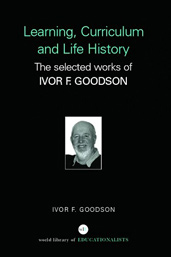Learning, Curriculum and Life Politics: the selected works of Ivor F. Goodson
Towards a Social Constructionist Perspective
In curriculum research there are a range of foci that are amenable to social constructionist study, for instance:
- The individual: life history and career.
- The group or collective: professions, categories, subjects and disciplines, for instance, evolve rather as social movements over time. Likewise schools and classrooms develop patterns of stability and change.
- The relational: the various permutations of relations between individuals, between groups and collectivities and between individuals, groups and collectivities; and the way these relations change over time.
Of course the relationship between individual and collective (as between action and structure) is perennially elusive. But our studies may, as has largely been the case in the past, accept or exacerbate fragmentation or alternatively, as should be our intention in the future, seek integration.
In examining individual teachers' lives the life history method might be usefully rehabilitated. The genesis of life histories can be located in anthropological work at the beginning of this century; the main take-up by sociologists occurred later in a series of urban and social studies at the University of Chicago.
For a number of reasons, which I have analyzed elsewhere (Goodson 1988), this work became less and less of a priority in the Chicago studies of the city and as a result the method fell into neglect until recently. In its more contemporary usage life history work has focused mainly on studies of deviance, crime and urban ethnography. The methodology of life history is therefore still relatively undeveloped and its use in the study of schooling only just beginning. This omission in the study of schooling is regrettable and moving from programmatic exhortation to empirical investigation have employed life history data to explore the intersection between biography, history and structure with specific regard to the secondary school curriculum.
